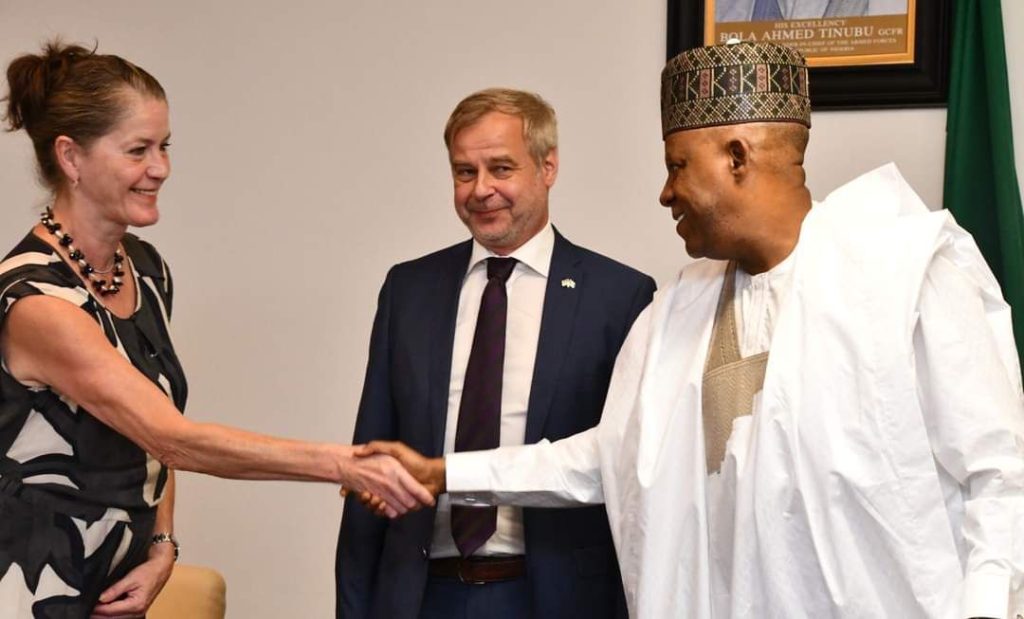Stanley Kingsley Nkwocha, Senior Special Assistant to the President on Media & Communications (Office of the Vice President), stated in a press release that Vice President Kashim Shettima has reiterated Nigeria’s readiness to tap into the $130 billion global hydrogen market by partnering with the Republic of Germany in the development of its green energy sector.
The idea, according to him, is the advancement of the country’s hydrogen market in line with its renewable energy objectives and the global energy transition plan from fossil to green sources.
Senator Shettima stated this on Friday when he received on a courtesy visit to the Presidential Villa, a German delegation led by a member of German Parliament and Hydrogen Commissioner, Federal Ministry of Education and Research, Mr Till Mansmann.
Underscoring the importance of strong partnership between Nigeria and Germany, the Vice President said, “We cannot run away from the fact that sooner than later we have to do away with fossil fuels and resort to green energy for a sustainable world and an inclusive economic growth.
“We appreciate you and there is ample opportunity for us to partner towards the development of the 130 billion-dollars global hydrogen market projected by the World Bank to grow at 9% per annum.”
On the potentials in hydrogen development, VP Shettima expressed optimism that if Nigeria gets its acts right, the entire African continent will equally get it right.
He noted: “Hydrogen has the potential of revolutionizing a lot of industries in Nigeria, including fertilizer production. The Federal Ministry of Science and Technology is ready to partner with authorities in Germany to drive the process towards developing the hydrogen market in Nigeria and beyond.
“Partnering to develop the hydrogen market in Nigeria will positively impact the rest of the African continent given its potentials and position. The potentials are here in Nigeria. When Nigeria gets its acts right, Africa will get it right too. You have a partner in Nigeria, In President Tinubu, you have a partner that you can trust. Leadership is about the ability to provide ideas to the problems of a nation,” he added.
The VP commended Germany for the sacrifice and empathy the European country has shown towards other countries in different areas, noting that “though not endowed with a lot of natural resources, Germany is blessed with the human capital that has made the country a global leader across diverse fields, including technology and devotion to ethics.”
Earlier, Head of the German Delegation/Member of German Parliament and Hydrogen Commissioner, Mansmann, said collaboration with Nigeria and institutions like the University of Nigeria, Nsukka (UNN) is crucial for achieving the goals outlined in Germany’s National Hydrogen Strategy.
He said, “Nigeria is a very important partner for the global transformation of energy. If you want to fight climate change, it makes no sense if one country alone goes its own pathway. We need to come together in a lot of cooperations in technology, science and human resources.”
Acknowledging Nigeria’s significant potential in the field of green energy, particularly hydrogen production, Mansmann said, “About 30 countries in Africa have the potential for green energy, especially hydrogen, and Nigeria is one of the most powerful countries in this field.”
On the role of universities in fostering innovation and nurturing future talent, he recalled his recent visit to UNN, saying, “We visited the University of Nigeria, Nsukka, and it was really interesting to see the programmes coming from there in renewable energies”.
He stressed the importance of cooperation in the field of science with universities, just as he said, “A lot of young, well-educated people are the ones that will transform the world in the future. Because of that, we think cooperation in the field of science with universities is most important.”
He added that Germany’s transition to carbon neutrality by 2045 requires a significant shift towards green energy imports.
“Germany will be an energy importing country for the next decades in huge amounts. Currently, we import 70% of our energy in the form of fossils, and we want to get out of fossils by 2045. That means in 20 years all imported energy needs to be green. And we know there are great potentials in Africa and Nigeria,” he added.

